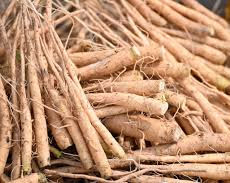Ginkgo Biloba: An Ancient Remedy for Mild Dementia
- Jodi McKee
- Apr 30
- 4 min read
Updated: May 12
As we age, it's normal to experience shifts in memory and mental clarity. However, when forgetfulness begins to interfere with daily life, many people seek gentle, effective ways to support brain health, ideally without the side effects of conventional medications.

One time-honored botanical remedy that continues to gain scientific attention is Ginkgo biloba. This plant has been revered in traditional medicine for centuries, and modern research now supports its role in aiding mild cognitive decline and early dementia. In this article, we will explore a 2025 meta-analysis that suggests a standardized Ginkgo extract, EGb 761®, may offer genuine help for individuals navigating the early stages of dementia. Let’s unpack what the study revealed and what it signifies for natural brain support.
What Is Mild Dementia?
Mild dementia goes beyond occasional memory slips. It often encompasses:
Difficulty remembering recent events
Trouble concentrating
Challenges in making decisions
Struggles with managing daily tasks, such as cooking or paying bills
Emotional changes like apathy, anxiety, or confusion
While these symptoms are not as severe as those in later-stage dementia, they can significantly affect one’s quality of life and independence.
Many pharmaceutical drugs used to manage dementia symptoms, including cholinesterase inhibitors, can be effective, but they frequently come with side effects. These medications are typically approved only for diagnosed cases of Alzheimer’s disease (AD). As a result, herbal medicine may provide a gentler and more holistic support option.
Enter Ginkgo Biloba: An Ancient Tree with Modern Promise
The Ginkgo tree is remarkable; it is one of the oldest living species on Earth. Its fan-shaped leaves have been utilized in Traditional Chinese Medicine for centuries to support memory, circulation, and mental clarity.
Today, scientific attention is directed toward a standardized extract of Ginkgo biloba, known as EGb 761®, produced by Dr. Willmar Schwabe GmbH & Co. in Germany. This specific extract is carefully prepared to ensure a balance of flavonoids and terpene lactones, the compounds believed to provide Ginkgo's brain-supportive effects.
EGb 761® has been studied for use in:
Alzheimer’s disease
Vascular dementia
Mixed dementia
Age-related cognitive decline
But what about mild dementia, where diagnosis can be less precise, and early intervention is key?

The 2025 Meta-Analysis: What the Study Found
Here's the science behind it all
A February 2025 meta-analysis published in the World Journal of Biological Psychiatry reviewed four high-quality clinical trials involving 1,598 patients, nearly half of whom had mild dementia. Patients received 240 mg/day of EGb 761® over a period of 22 to 24 weeks. The trials evaluated significant areas of cognitive health, including:
Memory and cognition (using the SKT score)
Activities of daily living (ADL)
Global brain function (GBS scale)
Neuropsychiatric symptoms (including mood, anxiety, and behavioral changes)
Quality of life (QoL)
Results:
Compared to placebo, EGb 761® resulted in statistically significant improvements in:
Cognition (P = 0.04)
ADL (P = 0.01)
Global brain function (P = 0.01)
Trends toward improvement in mood and quality of life
The study authors highlighted the favorable safety profile of EGb 761®, with no significant increase in adverse effects compared to the placebo.
In layman's terms: Science indicates that Ginkgo might help you remember where you left your coffee and why you walked into that room.

What Does This Mean for You?
This research reinforces what herbalists and holistic practitioners have observed for years: Ginkgo biloba can support cognitive function naturally, particularly in the early stages of decline. While Ginkgo is not a cure for dementia, it offers a safe, accessible, plant-based choice to:
Support memory and clarity
Improve daily functioning
Manage mood or emotional symptoms
Enhance the quality of life in older adults
For those in search of alternatives to pharmaceutical interventions or wishing to combine the best of both worlds, EGb 761® may be a powerful ally.
Considerations and Cautions
Although this meta-analysis is promising, it’s vital to consider a few factors:
Not all Ginkgo supplements are created equal. EGb 761® is a highly standardized extract. Cheaper or generic Ginkgo products may not provide the same effects or safety.
Ginkgo may interact with medications, particularly blood thinners. Always consult a qualified healthcare provider before starting any new herbal supplement, especially if you take other medications or have a chronic condition.
This study was partially funded by the manufacturer of EGb 761®, so independent research is still essential.
Final Thoughts: Herbal Medicine for the Modern Mind
As someone who has witnessed the power of herbs both personally and professionally, I believe Ginkgo biloba exemplifies the best of what herbal medicine can offer—a blend of ancient wisdom and modern science.
At HealWise, we are dedicated to sharing tools that reconnect people with the healing power of plants. Whether you are supporting a loved one with early memory loss or nurturing your own brain health as you age, Ginkgo is a plant worth getting to know.
Learn More
Looking to grow and utilize herbs at home? Check out our ebook, Harvest & Herb: A Modern Medicinal Garden. This guide will teach you how to grow, harvest, and use herbal allies like lemon balm, rosemary, and more.
You can download your copy here and explore our full library of plant-based resources.
Check out our favorite Ginkgo Biloba and memory support products at our Fullscript store.
Learn more about the study here.
The information offered on HealWise websites is for educational purposes only. HealWise makes no medical claims and is not intended to diagnose or treat medical conditions. Links to external sites are for informational purposes only. HealWise neither endorses them nor is responsible for their content in any way. Readers are advised to conduct their research regarding the safety and usage of any herbs or supplements.
.jpg)



Comments